Woody Allen – An Essay on the Nature of the Comical
Autor Vittorio Hösleen Limba Engleză Paperback – 28 feb 2007
Preț: 139.94 lei
Nou
Puncte Express: 210
Preț estimativ în valută:
26.78€ • 27.86$ • 22.11£
26.78€ • 27.86$ • 22.11£
Carte tipărită la comandă
Livrare economică 14-28 aprilie
Preluare comenzi: 021 569.72.76
Specificații
ISBN-13: 9780268031046
ISBN-10: 0268031045
Pagini: 112
Dimensiuni: 144 x 215 x 11 mm
Greutate: 0.17 kg
Ediția:1
Editura: MR – University of Notre Dame Press
ISBN-10: 0268031045
Pagini: 112
Dimensiuni: 144 x 215 x 11 mm
Greutate: 0.17 kg
Ediția:1
Editura: MR – University of Notre Dame Press
Recenzii
“With breathtaking intellectual agility, Hosle . . . balances theories of the comical with the humor of Woody Allen. . . . His analysis never damages Allen's verbal or visual humor. Difficult, without being ponderous, his 'essay' demands sophistication and erudition. It will please scholars who love a profound challenge.” —Choice
“Hösle has an impressive command of Allen's work, including the short stories and secondary literature, and he weaves in and out of different textual examples with aplomb. His address to them is speculative, confident.” —Philosophy in Review
Notă biografică
VITTORIO HÖSLE is Paul G. Kimball Chair of Arts and Letters in the Department of German Languages & Literatures, concurrent professor of philosophy, and concurrent professor of government and international studies at the University of Notre Dame.
Descriere
In this extended essay, Vittorio Hösle develops a theory of the comical and applies it to interpret both the recurrent personae played by Woody Allen the actor and the philosophical issues addressed by Woody Allen the director in his films. Taking Henri Bergson’s analysis of laughter as a starting point, Hösle integrates aspects of other theories of laughter to construct his own more finely-articulated and expanded model. With this theory in hand, Hösle discusses the incongruity in the characters played by Woody Allen and describes how these personae are realized in his work.
Hösle focuses on the philosophical issues in Allen’s major films by exploring the identity problem in Play It Again, Sam and Zelig, the shortcomings of the positivist concept of reality in A Midsummer Night’s Sex Comedy, the relation between reality and art in The Purple Rose of Cairo, the objective validity of morality in Crimes and Misdemeanors, the power of evil in Shadows and Fog, and the relation between art and morality in Bullets over Broadway. He cites Allen’s virtuosic reinterpretation of older forms of expression and his integration of the fantastic into the comic universe—elements like the giant breasts, anxious sperm, extraterrestrials, ghosts, and magicians that populate his movies—as formal moves akin to those of Aristophanes. Both an overview of Allen’s work and a philosophical analysis of laughter, Hösle’s study demonstrates why Allen’s films have more to offer us—morally, philosophically, and artistically—than just a few laughs.
“In Woody Allen, Vittorio Hösle goes a long way toward explaining everything you wanted to know about Allen but were afraid to ask. Just why exactly is he funny, and why does his humor have a strong appeal for academics? In his comprehensive analysis of Allen’s work, Hösle outlines a workable theory of humor, illustrates his conclusions by referring to the films and prose, and points out several philosophic motifs underlying Allen’s deceptively complex comedies. Hösle’s work elevates the enjoyment of Allen’s films from guilty pleasure to satisfying intellectual engagement with an intriguing contemporary thinker and artist.” —Richard A. Blake, S.J., Boston College
“Vittorio Hösle presents a compelling overview of Allen’s work in which he discusses different theories of laughter and argues for the priority of the incongruity theory as the only one able to answer the normative question, what distinguises good from bad laughter? On this theoretical basis he goes on to delve into both the humor and the philosophical profundity of Allen’s films.” —Sander Lee, Keene State College




